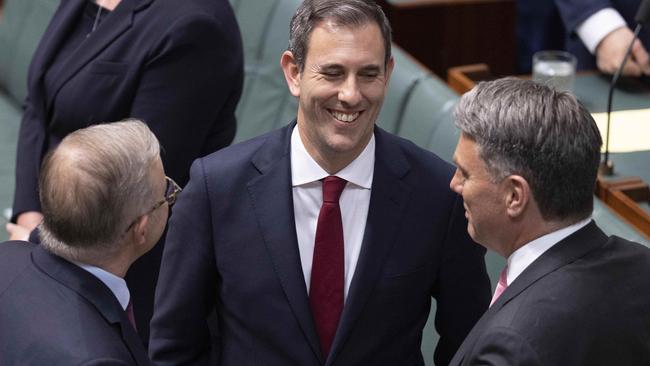
Richard Marles had been simply told that the tax would only apply to people with more than $3m in their superannuation funds and that represented a small portion of the population. The tax actually went much further.
Marles believed what he had been told so when later he was asked detailed questions he was made to look foolish because he had no idea of the wider ramifications.
Dr Chalmers knew those wider ramifications and not only should he have made sure the deputy prime minister was properly briefed, but also realised that the detail and the personal implications made it inappropriate for Albanese to announce the tax.
The super tax taxes unrealised capital gains in a way that few other countries have ever contemplated and treats those “capital gains” as income not at a discount rate.
It reverses basic pillars of our tax system.
As the Weekend Australian pointed out, farmers with farm property in their fund could see their farms skyrocket in value during good seasons and be levied large cash sums on those unrealised value gains only to see the unrealised gain disappear in time of drought.
The same applies to shares.
In addition the tax is not indexed, so in around a decade if, as now looks possible, high inflation continues, then the indexed tax-free amounts will approach $3m – with the draconian Chalmers tax capturing vast numbers.
During the election campaign, Albanese had personally promised that there would be no change in superannuation so was machinegunning his own promise without the knowledge of his deputy.
But there was also a personal reason why Albanese should never have made the announcement.

Albanese was elected to parliament prior to 2004 and is now on an annual salary of around $564,000.
That gives him a lifetime pension of around $350,000 indexed to parliamentary salaries where 83 per cent is passed to his partner and /or wife.
If he invested $9m at 4 per cent, he could cover the current pension.
To that we add the value of indexing for life for Albanese and his partner/wife.
My guess is that given his current partner is around 15 years younger, the spouse/partner entitlement takes the value of the PM’s pension close to $20m.
That’s only a guess, but it is likely Albanese would know very accurately the worth of his entitlement given he has been through divorce proceedings.
It’s not really appropriate that a person with such an enormous value in his pension entitlement should announce vicious attacks on those individuals who have “only” $3m in superannuation funds.
Chalmers, who was elected to parliament after 2004, has no such entitlement so should have made the announcement.
But the February 28 drama goes deeper.
Kennedy quantified revenue forgone in a series of tax deductions, including items like the family home, GST exceptions, negative gearing and so on.
The total was around $200bn, but that figure is dwarfed by the unfunded liability that covers Albanese-style public servant and political entitlements awarded to people who joined the public service before 2005 and parliament before 2004 (defence people 2015).
Officially there is a $300bn shortfall, but my actuarial friends tell me but the assumptions are unrealistic and the shortfall is least $500bn and could be as high as $1 trillion.
It is the people at the top rather than ordinary public servants who are the main contributors to the shortfall, which dwarfs the measures Kennedy announced
While Kennedy obeyed his Minister, he is an excellent public servant who must have felt uncomfortable that he personally was one of the biggest beneficiaries of the scheme.
Politicians of the day recognised that scheme some two decades ago was an unaffordable rort, which took away from newcomers to both the parliament and public service but not themselves.
In my view, it remains the wider responsibility of a treasury secretary in an environment of a draconian superannuation tax to alert the parliament to the much larger costs in unfunded pension entitlements.
In the past, public servants and politicians have protested against any change claiming it would be retrospective legislation, but that’s exactly what the government is attempting to do in its private sector superannuation tax.
Opposition Leader Peter Dutton, like Albanese joined the parliament before 2004 so is entitled to a lifetime bonanza pension.
He is opposing the legislation, but more importantly he needs to demand an inquiry from truly independent people as to exactly what the liability of the government is to politicians and public servants under this old scheme.
Realistic actuarial assumptions must be made, not those that are currently being used.
Marles has proven to be an excellent defence Minister.
But given his prime minister, treasurer and treasury secretary are caught in the supertax mire he must know this issue could easily develop into one of integrity abuse.
Marles needs to intervene in his role as deputy prime minister.
Footnote: There have been a number of cases where politicians and public servants married or partnered with people much younger, enabling the younger person to enjoy a pension for many years after the politician/public servant’s death. But the most famous case was former Prime Minister Sir William McMahon (whom Gough Whitlam defeated in the 1972 election) who left the parliament eight years later aged 74. As he was leaving, the entitlement for spouses and partners of politicians was lifted to 83 per cent of the politician’s final average salary, again indexed. William McMahon died six years after leaving parliament but his wife Lady Sonia McMahon was younger and lived another 22 years. She was very grateful that the parliament (perhaps responding to manoeuvring by her husband) had increased her entitlement.





When the new super tax was announced on the last day of February 2023 there was a drama embracing Deputy Prime Minister Richard Marles, Prime Minister Anthony Albanese, Treasurer Jim Chalmers and Treasury Secretary Steven Kennedy.